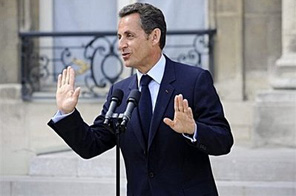Sarkozy announces 1.65-billion-euro farm aid plan
POLIGNY: President Nicolas Sarkozy announced a 650-million-euro aid plan Tuesday for France's subsidised but still struggling farmers, along with one billion euros in cheap loans.
"I will not let French agriculture be swept away by the crisis," Sarkozy said, in a speech in an eastern cheese-making town in which he declared farming an integral part of the country's identity.
"I have come to offer you an unprecedented plan of exceptional support for our agriculture which includes one billion euros in bank loans and 650 million euros of exceptional state aid," he said.
France is the European Union's biggest agricultural producer and farming employs 770,000 people, but the heavily state-supported sector is reeling from a 15-percent collapse in prices over the past year.
French farmers have in recent months mounted more of their famed protests, discharging gallons of milk in the street, blocking roads with slow-moving tractor convoys and erecting burning barricades on the Champs-Elysees.
Reacting to their concerns amid falling opinion polls and rumblings in his own right-wing majority, the president said the crisis in agriculture was due "above all to a lack of European and global regulation".
He called on the European Commission to limit market speculation on agricultural prices and to bring derivative financial products under control.
"In the area of agricultural commodities markets, Europe should put in place proper regulation," he said.
The new aid plan will be put into action "in its totality" by the end of the year, Sarkozy said in his speech in Poligny, a town in the Jura region on the Swiss border best known as the home of Comte cheese.
A European Commission spokesman said the EU executive would decide once it had seen details of Sarkozy's plan whether or not it breaks competition rules.
The main farming union, the FNSEA, gave the project guarded support but warned that a short-term programme of handouts was no substitute for the moves it has demanded to officially regulate retail food prices.
A spokesman for the Small Farmers' Confederation expressed disappointment in the plan, arguing that it did not go much further than standard emergency measures in time of bad weather.
"Nicolas Sarkozy appears to only now be discovering there are structural causes to this crisis and that European policy needs to be reformed. He tells us this one year after the French EU presidency," Philippe Colin said.
Sarkozy declared agriculture to be France's most important economic sector, claiming "an annual turnover of 163 billion euros, far ahead of the industrial sector", although it was not clear if this included food production industries.
Sarkozy said it was "unacceptable" that prices paid to farmers for their products had dropped by 20 percent over the last year while prices the consumer pays for food had fallen by only one percent.
"This gap is putting our food production in danger," he said.
He said interest rates on the new loans on offer would be 1.5 percent, with young farmers getting an even lower rate of 1.0 percent. That, he said, would allow every farmer to sort out his or her finances and invest for the future.
France is the biggest beneficiary of the EU's massive farm subsidy system, the Common Agricultural Policy, receiving 10 billion euros last year, ahead of Spain with 7.1 billion and Germany with 6.6 billion.
The French state has been rapped for systematically granting fruit and vegetable farmers funds intended to help cope with short-term crises, and was asked this year to recover 330 million euros paid out between 1992 and 2002.
Paris has defended the practice and demanded more time to address the issue, amid threats of further protests by fruit farmers and market gardeners.
Farmers in France and Germany have led Europe-wide protests over dairy prices -- which have halved in some countries since 2007. Twenty of the 27 EU countries now back efforts to increase prices for milk, butter and cheese.






